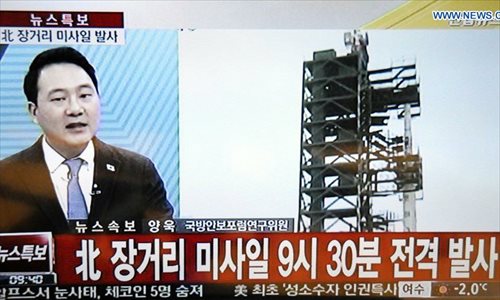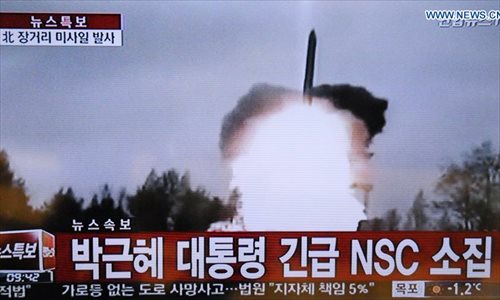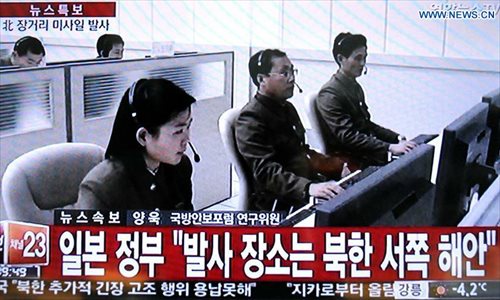DPRK announces successful launch of Kwangmyongsong-4 satellite

A video grab taken on Feb. 7, 2016 from South Korean TV shows the news report on the launch of a long-range rocket by the Democratic People's Republic of Korea (DPRK), in Seoul, South Korea. The DPRK on Sunday launched a long-range rocket as planned, Yonhap news agency reported citing South Korea's defense authorities. Photo: Xinhua
The Democratic People's Republic of Korea (DPRK) on Sunday successfully launched a Kwangmyongsong-4 satellite, the Korean Central Television (KCTV) reported.
The Kwangmyongsong-4 satellite, "a newly developed" earth observation satellite, blasted off at 9:00 a.m. local time (0030 GMT) from the Sohae Space Center in Cholsan County, North Phyongan Province, and later entered the target orbit, said the KCTV.
DPRK's leader Kim Jong Un signed the order to launch the satellite on Saturday and the KCTV disclosed photos of his signature.
The satellite is going round the polar orbit at 494.6 km perigee altitude and 500 km apogee altitude at the 97.4-degree angle of inclination, with a cycle of 94 minutes and 24 seconds, said a statement issued by the National Aerospace Development Administration (NADA) of the DPRK and carried by the official news agency KCNA.
The DPRK has planned the satellite in a five-year national aerospace development program and will launch more satellites in the future in line with the policy of the ruling Workers' Party, the statement said.
The successful launch marks "an epochal event" in developing the country's science, technology, economy and defense capability by "legitimately exercising the right to use space for independent and peaceful purposes," the statement stressed.
The launch came only nine days ahead of the "Day of the Shining Star," the birthday of the DPRK's late leader Kim Jong Il, and is seen as part of the events to celebrate the anniversary.
South Korean President Park Geun-hye on Sunday denounced the DPRK's rocket launch as "an unacceptable provocative act," after she called an emergency meeting of the National Security Council (NSC) to discuss countermeasures.
Pyongyang informed international organizations Tuesday of its plan to launch what it called an earth observation satellite between Feb. 8 and 25, and advanced the date to Feb. 7-14 on Saturday.
The launch, widely seen as a disguised test of long-range ballistic missile technology, came about a month after the DPRK tested what it claimed to be its first hydrogen bomb, the fourth nuclear detonation following three other ones in 2006, 2009 and 2013.
UN Security Council resolutions ban the DPRK from launching a rocket by using any ballistic missile technologies. A long-range rocket and a ballistic missile have overlapping technologies.
The DPRK used three-stage Unha-3 rocket to put the Kwangmyongsong-3 satellite into orbit in December 2012, two months before staging its third nuclear test. The international community believed it was the first successful satellite launch by the DPRK.
On April 13, 2012, the DPRK launched the first Kwangmyongsong-3 satellite, but later confirmed that the satellite failed to enter its intended orbit.
On April 5, 2009, the DPRK conducted a similar launch which, according to the official news agency KCNA, successfully put the Kwangmyongsong-2 communication satellite into orbit. But countries including South Korea, Russia and the United States said the launch was a failure.

A video grab taken on Feb. 7, 2016 from South Korean TV shows the news report on the launch of a long-range rocket by the Democratic People's Republic of Korea (DPRK), in Seoul, South Korea. The DPRK on Sunday launched a long-range rocket as planned, Yonhap news agency reported citing South Korea's defense authorities. (Xinhua/Jiang Ye)

A video grab taken on Feb. 7, 2016 from South Korean TV shows the news report on the launch of a long-range rocket by the Democratic People's Republic of Korea (DPRK), in Seoul, South Korea. The DPRK on Sunday launched a long-range rocket as planned, Yonhap news agency reported citing South Korea's defense authorities. (Xinhua/Jiang Ye)
S.Korea sees DPRK rocket's successful launch into orbit
South Korean military has seen a rocket launched by the Democratic People's Republic of Korea (DPRK) successfully flying into orbit, Yonhap news agency reported citing a military official.
The military estimated that the DPRK rocket had entered into orbit, indicating a high possibility for a successful launch.
The official was quoted saying that additional analysis will be needed to determine whether the launched vehicle operates normally.
A South Korean defense ministry official told Xinhua that the success of the launch hasn't been determined yet. He said the final determination will be announced later in the day.
Pyongyang launched a rocket at about 9:30 a.m. (0030 GMT) on Sunday, just a day after the revised notification of its plan to move up the launch window to Feb. 7-14 from the previous Feb. 8-25.
The launch came about a month after what it claimed was its first H-bomb test on Jan. 6 in violation of UN Security Council resolutions.
Related: DPRK'S rocket launch may have failed: YONHAP
The Democratic People's Republic of Korea (DPRK)'s long-range rocket launch may have failed, Yonhap news agency reported Sunday citing a military source.
The unidentified military source was quoted as saying that the DPRK rocket, which was launched at 9:30 a.m. local time (0030 GMT), disappeared from radars six minutes later at a location in waters southwest of the southern resort island of Jeju.
As the rocket disappeared within the detectable range of radars, the military saw a high possibility for the failure, according to the report.
A South Korea's defense ministry official told Xinhua that whether the rocket launch failed hasn't been determined yet, noting that the military is now analyzing the launch.
The DPRK rocket was launched from its main Tongchang-ri rocket base on the west coast, a day after Pyongyang notified the International Maritime Organization of its revised plan to move up the launch window to Feb. 7-14 from the previous Feb. 8-25.
UN Security Council resolutions ban the DPRK from test-firing a rocket by use of ballistic missile technology. Rockets and ballistic missiles have overlapping technologies.
DPRK launches long-range rocket
The Democratic People's Republic of Korea (DPRK) on Sunday launched a long-range rocket as planned, Yonhap news agency reported citing South Korea's defense authorities.
The rocket was fired at about 9:30 a.m. local time (0030 GMT) from the DPRK's Tongchang-ri launch station on its west coast.
The South Korean military detected the rocket just a minute after the launch with its surveillance assets, seeing the rocket succeed in its first-stage separation.
The first stage of the rocket fell on western waters of South Korea. Additional debris landed on waters near the country's southern resort island of Jeju.
The rocket disappeared from radars of the South Korean military at 9:36 a.m., the military said, noting that more verification will be needed to confirm the final success of the rocket launch.
South Korean President Park Geun-hye called an emergency meeting of the National Security Council (NSC) right after the rocket launch to discuss countermeasures.
Seoul's foreign ministry reportedly requested an emergency meeting of UN Security Council, which bans the DPRK from testing any of its ballistic missile technologies.
There has been no damage reported from civil aircrafts and shipping, South Korea's transport ministry was quoted as saying.
South Korea and the United States are jointly assessing whether the DPRK's rocket launch succeeds.
CNN: Success of "missile" test unknown